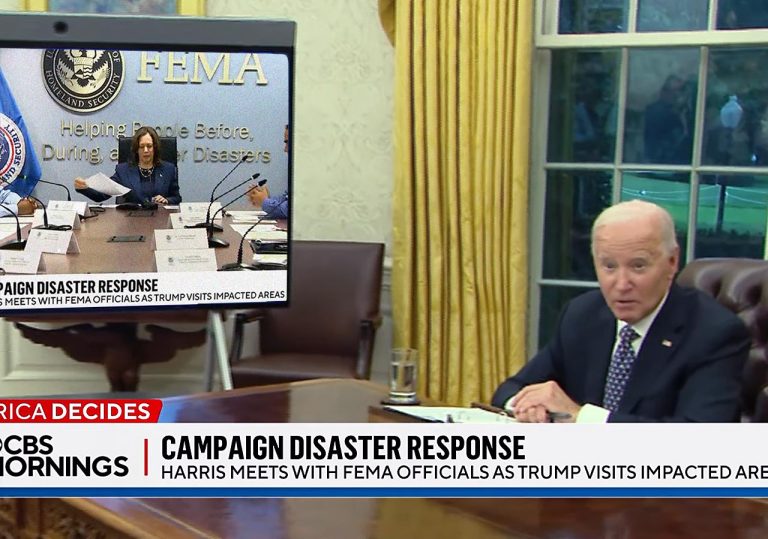
FEMA has been criticized for its increasing focus on immigration and diversity, equity and inclusion policies, while its response to recent hurricanes has also come under scrutiny. [emphasis, links added]
Many Americans believe that FEMA is only focused on helping respond to disasters, but a closer look at FEMA's recent internal documents, spending, and public actions reveals: FEMA has expanded its focus to address the flow of immigrants into the United States and has sought to increase DEI initiatives on gender, sexual orientation, and race.
FEMA's 2022-2026 Strategic Plan is an overarching document that agencies have developed to outline priorities. Its primary goal is not disaster relief but diversity, equity and inclusion.
Among its first goals, the plan promises to “instill equity as the foundation for emergency management.”
Its second priority is “leading climate resilience across communities.”
FEMA's “readiness” is the plan's third goal.
“Diversity, equity, and inclusion are not optional; they must be core components of the institution’s internal conduct and execution of its mission. the plan reads.
FEMA makes clear in its plan Equity, including racial identity, will be considered when allocating aid, Stressing that aid should be distributed “fairly and equitably to all affected – Especially those who are disproportionately affected.“
“Special” indicates that the DEI community believes that certain groups, including transgender people or minority groups, are disproportionately affected by natural disasters.
FEMA also hired Montage Marketing Group to “promote diversity and engage employees in creating an inclusive workplace.” These efforts include launching an Inclusive Diversity Committee and promoting Transgender Day of Remembrance.
Homeland Security Secretary Alejandro Mayorkas told reporters FEMA's shift in focus during the agency's response to Hurricane Helene, which devastated parts of North Carolina, Tennessee and West Virginia Become the center of attention. While the Federal Emergency Management Agency has enough funding to respond to deadly Hurricane Milton, there may not be enough to end this hurricane season.
“We are using the funds we have to meet immediate needs,” Mayorkas told reporters at the time. “We expect another hurricane to hit. The Federal Emergency Management Agency does not have enough funding to get through the season.
His comments came after reports emerged in April this year. FEMA announced $640 million in new funding, with $300 million set aside to help immigrants settle in the U.S. and another $340 million set aside as immigration grants to cities.
Critics immediately raised questions about FEMA’s immigration funding, which is nothing new but stands out in light of Mayorkas’ comments.
Defenders of FEMA point out that immigration and disaster relief funds are funded in different ways and do not necessarily deprive each other.
Critics think this shows When immigration issues are well-funded but the government is in danger of running out of disaster relief funding, the Federal Emergency Management Agency (FEMA) has the wrong priorities.
The White House stressed to Center Square that FEMA is not in danger of running out of funds immediately, leaving current victims without assistance.
“FEMA has the resources needed for immediate response and recovery efforts. As FEMA Administrator Dean Criswell said, she has every authority to spend according to the president's budget, but we're not over hurricane season yet, so we need to keep an eye on this situation,” said Director of Public Affairs and Federal Emergency Management Agency spokesperson Jaclyn Rotenberg said in a statement. “We may need to regain access to desperately needed funding and we will be watching closely.”
But the Federal Emergency Management Agency has spent hundreds of millions of dollars over the years to address the border crisis, with at least 14 million illegal immigrants crossing into the United States since President Joe Biden took office.
As another example of FEMA's broader focus, the New York Post reported that a video call roundtable last year included FEMA DEI leaders supporting a range of DEI efforts.
In this event titled “Helping LGBTQIA+ Survivors Before Disasters,” One federal employee discussed changing FEMA’s mission from “the greatest good for the greatest number” to a greater focus on “disaster equity.”
A 36-page FEMA DEI staff guide released in May 2023 states FEMA employees should “have conversations about differences based on race, religion, age, disability, gender, national origin, or sexual orientation.”
“The more diverse leadership, teams, and collaborations are, the stronger, more equitable, and more inclusive programs will become,” the report continues.
Top photo composite from CBS Mornings/YouTube screencap
Read more news
